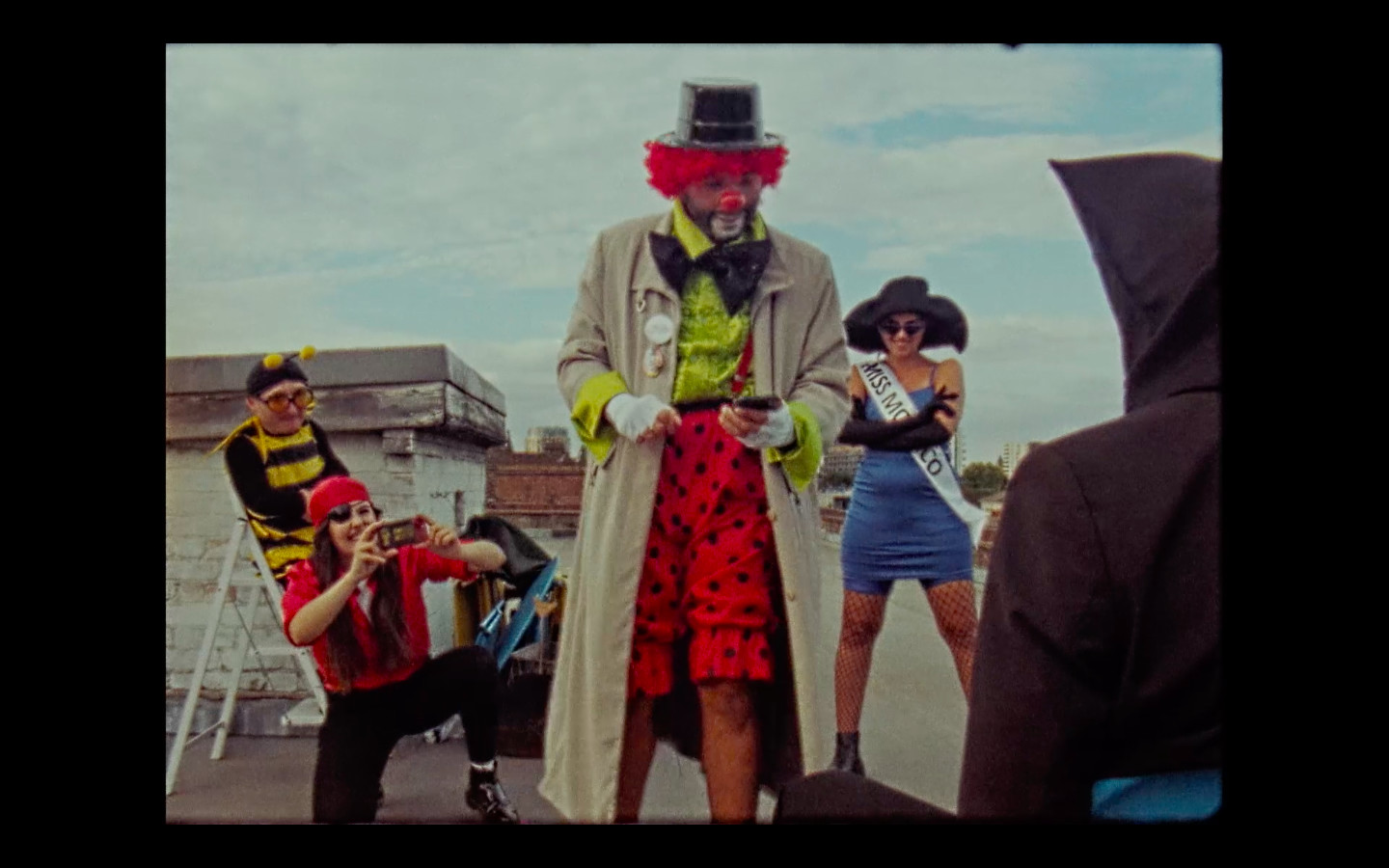Hugo Santa Cruz’s production co-op ANTi KiNO is a delightfully refreshing and progressive group that aims unapologetically to promote feature films and documentaries that take aim at the ethos of those in control of the film industry in their gilded cages. It is no surprise that his latest feature film ‘The Fifth Generation’ embodies the very principles set out in ANTi KiNO, which we wholeheartedly embrace at Rocks Festivals.
‘The Fifth Generation’ is an experimental dark comedy shot 5 times, over 5 days with 5 lead characters, where each distinctly filmed and carefully laid-out chapter bends the tired old rules and cliches of drama and cinema. The conversation centres upon the acute and ever-present jeopardy of our current climate emergency, as five radicalised environmentalists carry out the kidnapping of a major UK political figure in order to achieve their masterplan. Throughout their misadventures, we bear witness to the hilarious depths and intentions behind their mission. Hugo’s repetition of the events through different languages, genres and shooting styles invites audiences to come to a full-circle comprehension of each character and their motivations, whilst asking how “power, brutality and exploitation mimic the societal ills they so criticise in the run up to their climate action.”
‘The Fifth Generation’ will screen at Brighton Rocks on Friday 23 June at 8:30pm at The Actors as part of our ‘Double Trouble’ Feature Showcase.
Where did the idea for this wonderfully unique motley crew of radicalised anarchists come from?
In truth Miss Monaco is the only real anarchist of the lot; ‘The Fifth Generation’ gang is made up of Bobo the Clown (a Maoist), The Pirate (a St Pauli type antifascist), and then you have the Bank Robber and the Bee who are eco sympathisers, not quite activists but the story suggests that they have been seduced by Miss Monaco in order to take part in the climate action that happens in the film. With that, it is important to note that one way or another they’re all fucking each other senselessly; they’re like eco warrior rabbits!
The idea came from a script I was writing that takes place during the Spanish Civil War and during my research, I read something that struck a chord. The antifascist troops included such an amalgamation of left-wing ideals that they became impossible to manage. Essentially, the bad guys won because they were better organised – there’s a thought!
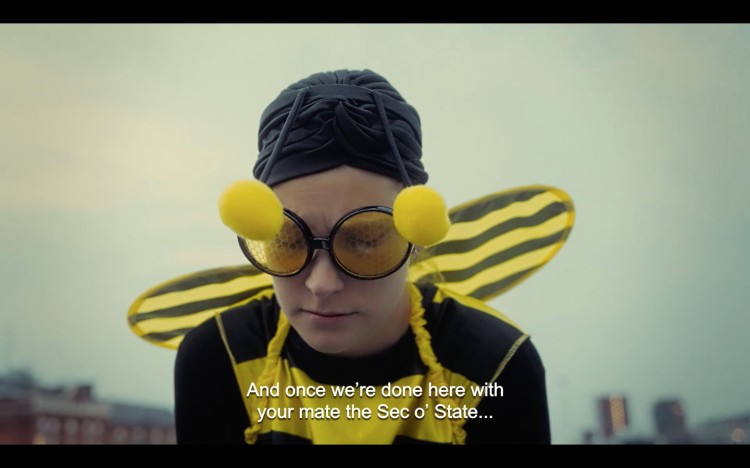
Why are you drawn to more experimental and off-the-wall forms of filmmaking?
I’ve been writing screenplays for a while but have only just started directing. I believe I have a solid storytelling muscle so when it comes to the execution – I want to see where things can go. That’s where the experimentation comes in and that also applies to the way in which the films are made. I run a film production co-operative called anti kino (kino means cinema in German). We’re anti everything that is wrong with the film industry: the wastage, the abuse of power, the exploitation…most notably the stifling of creativity.
I make features about characters who challenge the existing socio-political status quo. This not only makes for state-of-the-nation commentary films a la Ken Loach but also for high stakes drama. The films are still very much narrative. The experimentation really has more to do with a will to explore just how far we can stretch the narrative medium with as little money as possible. We may have limited resources but we make up for that with an unlimited creative vision!
What inspirations do you draw from in your filmmaking and in ‘The Fifth Generation’?
I’m a staunch proponent of the academic referencing approach to filmmaking and peppering frames with visual meaning. I also can’t hide the fact that I’ve been sucking Fassbinder dick since we started this ANTi KiNO palaver in 2019, so when it came to making our second feature I thought: let’s go all the way.
Enter ‘The Fifth Generation’, a total rip off of the last 10 minutes of Fassbinder’s ‘The Third Generation’ (1979). A film about a group of Baader Meinhoff type activists who are cleverly conned into kidnapping a wealthy impresario. Yes, you have Hanna Schygulla dressed up as a clown, Udo Kier as Miss Monaco 1979, and there’s also a pirate and a ladybug in the gang but the, ahem…SIMILARITIES end there.
Otherwise, I’m a big fan of Luis Buñuel’s surrealism and love the story of how whilst filming ‘Obscure Object of Desire’ (1977) the production was halted when Carole Bouquet, the actress cast to play the lead role of Conchita, refused to do certain scenes, which led to the casting of the wonderful Angela Molina to complete said scenes. In the final cut you’re therefore seeing two actors inhabit the same role, it generates an emotion and it can be interpreted in so many ways. Is it surrealism? Is it problem solving? Does it work? Yes.
By the way, there’s a ‘Discreet Charm of The Bourgeoisie’ easter egg in Bobo the Clown’s bedroom. BoBo is a French portmanteau for Bohemian Bourgeois… Semiotics. To top this all up and at risk of sounding like a pompous twat, we owe a huge debt to Bertold Brecht and his Epic Theatre approach, which presents drama in a way that invites the audience to extract a critical, self-reflective reaction to what’s being portrayed on stage as opposed to an emotional one.
Now if you sort of know what you’re doing and you can come up with something that is cinematic enough, you may get away with the fact that you’re essentially filming a play. I think we do well at that in the third segment of ‘The Fifth Generation’ but we’re really not that clever.
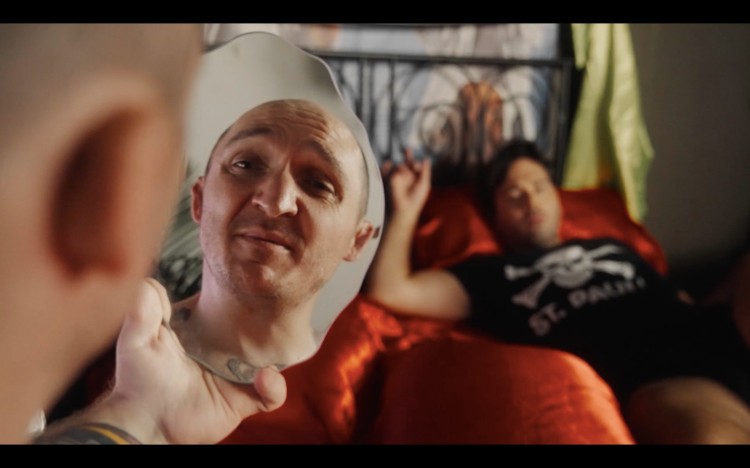
How did you achieve the distinct look and tone of each chapter while also lending a cohesion to the narrative?
When the idea of the rogue climate activists kidnapping the secretary of state for the environment connected with the Fassbinder reference, I sought to explore the themes that introduce the characters behind the costumes. POWER, BRUTALITY, EXPLOITATION… What else should films be about these days? I wanted to show how these characters that are bent on destroying a system (shit-stem) that abuses its power upon them, brutalises, and exploits them are literally doing just that to each other. It is dense and dialogue heavy but hopefully the humour cuts through and there are enough things happening on the screen to keep you watching.
With each repetition the message becomes clearer, or not! Maybe the repetition gets unbearable. That’s a valid reaction too! A lot of people are bored of hearing about climate change and the film acts as a metaphor for that. It really is up to the audience to decide whether they get why the characters are doing what they’re doing, why they may be right in doing so, but also why they may be wrong!
Your cast are such a treat to watch – how did you look for actors knowing they would all play different roles, have to speak different languages and have to embody each role in their own way?
Aren’t they just? I figured this would be a treat for any actor worth working with and we all had the best of times doing it. I met Leigh Gill backstage at a punk festival a few weeks after writing the thing and when it came to getting a cast together I thought he would be fantastic in it. I got in touch with his agent, he liked the script, and we worked things out so he could be with us just before shooting off to work in the new Steve McQueen film and the sequel to some other weird clown movie. He’s the only actor who doesn’t speak a second language but he makes up for it in acting chops, professionalism, and cool dude vibes. His Bobo the Clown is exactly how I envisioned it. We didn’t have to tweak anything.
The rest of the cast started falling into place as we approached the end of pre-production. We interviewed Chinese, Japanese, Pinoi and Bangladeshi actors and I was most gutted that we couldn’t find a British Nigerian actor who spoke a language other than English. We did an audition with a view to finding a more diverse cast. We had 300+ applications, whittled it down to 10 candidates (who spoke Jamaican Patois, Urdu, Punjabi, Hebrew), then Tommaso Giacomin came in, did his Bobo the Clown, and he was so gangster that we had to beg him to take the part. He plays the Italian Bank Robber in the multilingual segment.
At some point I realised that as cool as having a Japanese Bobo would be, I would be better off making my life easier and casting a Spanish speaking actor with whom I could work on the idiosyncrasies of the Prime Minister scene. I wrote it in Spanish Mexican because it’s the most fun and musical Spanish there is and then I found Alexandra Smith who’s a terrific actor and was up for the challenge.
Shirley Both is the lead in my first film ‘My London Lullaby’, she grew up in Germany so that’s that sorted, then Domino Soko is an up-and-coming Swiss actor who took care of Miss Monaco in French, and Rommel Rasheed who’s heavily involved with the “Actors East” school and theatre in Hackney felt just right for the role of the therapist in Arabic.
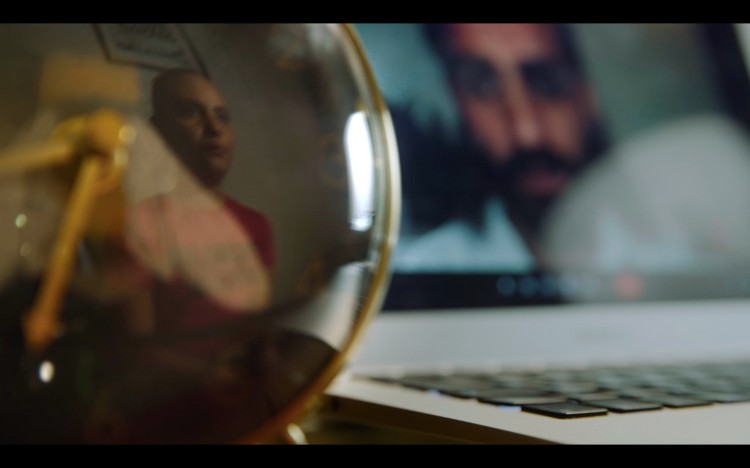
As a director, how do you work with your cast on their performances?
I make sure we cast them well, and that’s half the job done, then it’s all about fine tuning. Some things might need more work than others, in the case of Mexican Bobo the Clown Alexandra Smith asked me for a lot of guidance and rightly so, the part was very different to anything she had done before and I was asking a lot from her, but it was magical when we found it and she has become an audience favourite.
I’m of the Judith Weston school of directing actors where I build a relationship of trust between me and them, keep our conversations private, and my acting notes succinct, and; this is extremely important: I generate an environment that leads to creativity, playfulness, and good vibes. The last thing you want is bad vibes on set, the camera captures that and: lo and behold, next thing you know it you end up with a shit movie!
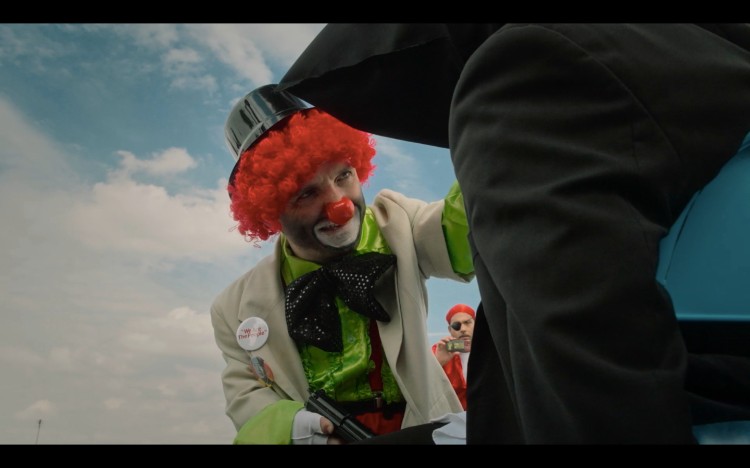
How did each shooting day differ in terms of approach and the outcome you were looking for?
It was all scheduled and we followed the schedule religiously. Because I know what I’m shooting and how the edit is vaguely going to pan out I don’t lose time with unnecessary coverage and boring the actors with repeated takes, so everything is very dynamic.
Part of the experiment was to do it in 5 days, which is crazy. For the first three days we worked as fast and loose as it gets, a tiny skeleton crew, stopping only for a one-hour lunch with tea breaks thrown in between set-ups and costume changes. We had a party/photo shoot on day 2. On day 3 we shot the bed scenes and the Super 8. Day 4: therapy (LOL). Day 5: the last segment (no spoilers here friends!) We really got the whole shebang in 5 days. I wish we could have gotten better image quality on the celluloid but that’s also part of the experiment.
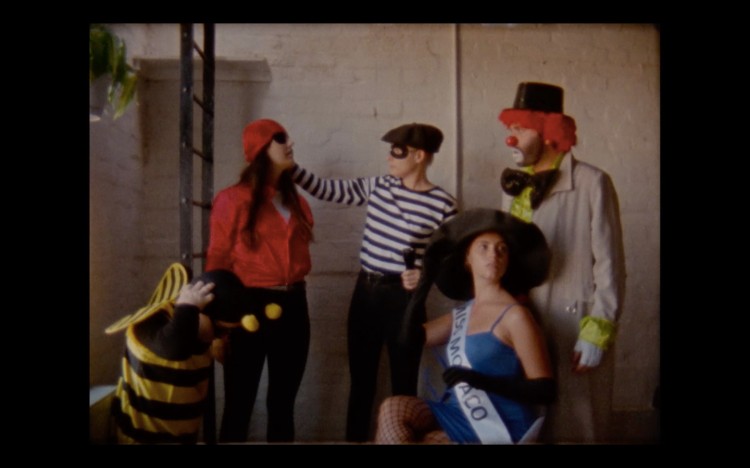
Why did you want to mix in Super8 footage with digital?
I wanted to counterpose the all too perfectly crisp 4K images we see in the first segment against the milky texture of the celluloid we see in the second segment. That DOES something to the audience. I’m interested in the experience of the audience – their journey.
Maybe some of that duality has something to do with the theme and the perception of who is doing what to whom. Who is right, who is wrong? I also really wanted to shoot on film and that was the cheapest way we could pull it off.
Postproduction must have been absolutely epic – how much footage did you have and how long did that take?
I don’t overshoot, if there’s anything that’s not working, either with the performance or the technical side of things, we stop, chat, adjust, and shoot until we get it right. The mirror scene for instance took 12 takes or so but there was a lot of technical tweaking involved. I have a theory that there are two types of actors: the ones that get it right in 1 or 2 takes; and the ones that nail it around take 7 or 8. Going beyond 8 takes can happen but it often means that the actor doesn’t know their lines or you’re trying to get something that you haven’t been able to convey to the actor.
As mentioned previously, I rarely do coverage. I prepare my shot lists with specific intention and we shoot what’s in the shot list with the caveat that if we see something we like, we allow for intuition to take over but yeah, the edit really was a psychosis inducing exercise.
I work with Franz Walsch Jr. (the editor) as close as two men can get. I come from a music production background and so my approach to the edit is very musical. Franz is more…German? That’s a compliment. I stopped counting after week 3 of 18-hour days. I can’t imagine doing that for a living.
What do you want people to take from your film?
Well…CLIMATE PAYBACK of course!

